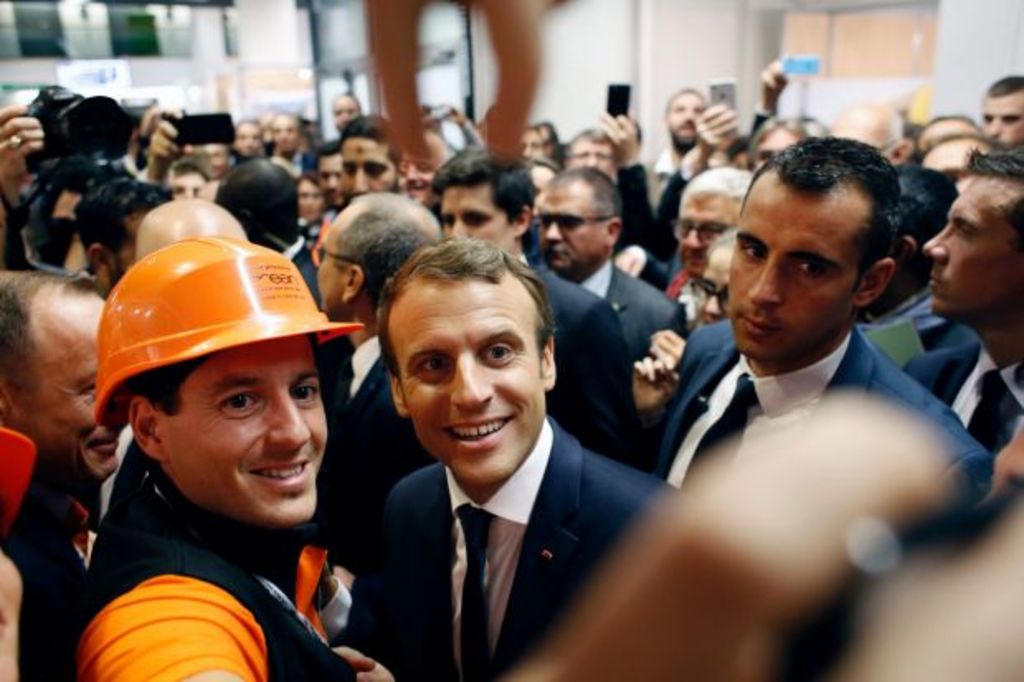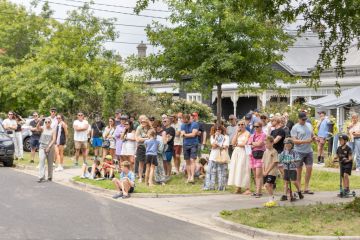Emmanuel Macron the 'enlightened despot' brings early spring to Paris

Paris: “It’s spring in autumn.”
Christophe Lecourtier looks out of his window at the grey, rain-washed cobbles of a Parisian street and sees sunshine.
“I hardly recognised my city when I came back,” says Lecourtier, who finished up as ambassador to Australia earlier this year and came back to run BusinessFrance, a national agency that supports exporters and investors.
After decades of disappointment, gloom and pessimism – when the French felt, rightly, that the world was leaving them behind, politically sclerotic and economically moribund – “there is something happening, which is to do with confidence”.
And that confidence seems to stem from one man: President Emmanuel Macron.
Macron has hardly paused after one of the most stunning political coups in a year replete with them. He has dismissed France’s political establishment and replaced it with his own movement, occupying not only the Elysee Palace but the parliament with a triple-digit majority.
The country has switched abruptly from depression to mania. Its people are allowing themselves to hope that this is more than a political honeymoon: that this is the change many have been wanting for years.
“Not many people were sure in March that there would be such a revolution,” Lecourtier says. “But that’s what this country is needing at the moment. Macron has been able to change the mood of the people.”
And when a country is more open to change, it sees the world not in terms of threats but opportunities, Lecourtier says.
Losing its grip
Since the 1980s, when Germany reuinified and the Eastern European countries were accepted into the EU, there has been the impression in France that they were “losing grip on globalisation, on what’s going on; that they don’t know how to compete, they don’t know how to win in a more global world.
“We were almost paralysed,” Lecourtier says. “I am not saying it’s all done and it’s in the pocket, but for the very first time there’s a sort of turning point.”
Macron is determined but he is also lucky. Europe as a whole is bouncing back from the financial crisis in industrial production, unemployment is decreasing, the competitiveness of its companies is better. There is stable ground on which to build.
And he is building on it, at astonishing speed.
The President has already pushed through new labour laws seeking to energise entrepreneurship, to rewrite France’s social pact and allow companies the right to hire and fire more freely, wiping away rules that made them overly cautious in expanding, reducing the influence of unions on workplace conditions.

Unions protesting against labour law reforms in France this month. Photo: AP
He has abolished a wealth tax that encouraged the rich and successful to leave the country with their assets and warded off speculators and investors.
Macron is financially constrained – the state is highly in debt – but he hopes that his work so far will bring in more money, more projects, more foreign investment. And as the deficit falls he hopes to find wriggle-room to ratchet down company tax and continue the virtuous cycle of economic growth, lifting all boats.
Next he plans huge welfare and training reform, along with a project of re-investing in poorer suburbs, re-opening public services and improving schools and hospitals in the unemployment-ravaged “banlieue” suburbs where crime – and Islamist extremism – breeds.
“It’s a revolution,” says Lecourtier. “Now there is a huge demand from the people, and Macron knows he will have to work hard not to disappoint them.”
Macron is working hard not to lose momentum. “As many decisions as possible have to be taken before next summer,” Lecourtier says. “He has to do as much as possible in the first 12 months.”
Beauty contest
Agnes Romatet-Espagne, director of communications at the foreign ministry, says Macron believes “we should not even take a breath between legislation”.
“There is not one aspect of political life which is not going to go through changes in the next months or years. The speed is pretty quick. Typically the French are anxious about changes but for the time being there are not major protests,” Romatet-Espagne says.
“They were aware of what to expect, it hasn’t taken anyone by surprise.”
The universe seems to be conspiring to favour Macron. Brexit has created a growing crisis of confidence on the other side of the channel, and business is looking south.
There is a beauty contest between Paris, Frankfurt, Madrid and Dublin to lure bankers and corporate headquarters into Europe, and Paris is putting on an impressive show.
Arnaud de Bresson, head of Paris Europlace, the equivalent of the City of London, says there was going to be a rebalancing anyway after a two-decade obsession with London, and Paris sees itself as the financial centre of the European Union, the only global city of the EU, with the culture, the allure, the stability and the infrastructure to win corporate hearts.
This week’s announcement that Paris would be the new headquarters for the European Banking Authority was the icing on the cake.
“I am sometimes dazed by the [amount] of good news we are receiving,” says Romatet-Espagne.
She adds that Macron has grand plans on the world stage, too. His headline-grabbing handshake battle with Trump was a signal of intent.
Macron recently gathered his ambassadors and gave them a new mission: their priority is France’s safety and security. This translates into an imperative to work to fix problems in the Middle East and Africa, to take control of both France and Europe’s borders.
Why the hurry? “Look at the state of the world,” Romatet-Espagne says. “Don’t you have a feeling of emergency? Look at the mood of Europe before the elections in France and the Netherlands. Don’t you feel a sense of emergency?
“Really we missed [dodged] a bullet here. It was a close call, we have to be aware of that. Not acting would be a big mistake.”
‘Climbing Everest without oxygen’
Macron’s most audacious foreign policy is to remake Europe.
He wants to head off the populist, nationalist wave with a “Europe that protects”: one that reassures and re-empowers its citizens; one that is more sceptical of and cautious in supporting Brussels’ international trade deals (bad news for Australia, which is in the first stages of pushing for a free trade agreement with the EU).
At the Sorbonne in September, Macron said Europe was “where our battle lies, our history, our identity”. But “today it finds itself weaker, exposed to the squalls of today’s globalisation and, surely even worse, the ideas which offer themselves up as preferable solutions”.
While Brexit inspired some European solidarity, it arose from a distrust of Brussels and a retreat from globalism that is not unique to the British Isles.
Macron’s answer is to bring Europe together on defence, with new shared military and intelligence capabilities that complement NATO’s, and to more effectively police its borders and “preserve our values”. This means faster asylum processing and the expulsion of those who do not need protection.
He wants to reform the common agricultural policy, to deepen co-operation on the environment, to more closely co-ordinate European education, economic policies and national budgets.
The plan has already met push-back. Slovakia’s Europe minister, Ivan Korcok, said Macron’s long-term vision for the EU was “like climbing Everest without oxygen. We need to go with the team, start in the first camp.”
And Macron has a big problem: Germany. He needed a friendly, influential Merkel on board, but instead there is paralysis across the border, as Merkel seems unable to pull together a ruling coalition after a disastrous election.

Macron needed a strong ally in Angela Merkel in Germany. Photo: AP
More ritual than revolt
But Macron cannot afford to take his eye off the domestic ball, either.
In France the gap between rich and poor has been growing for years, and Macron’s plans will not obviously reverse that, at least in the immediate future. He has already been dubbed in some quarters the “president for the rich”.
He plans to cut spending by €16 billion next year, including a civil servants pay freeze, making their first day of sick leave unpaid, and the loss of nearly 1600 public jobs – with 120,000 to go by 2022.
Especially in France, where the social model is a matter of faith, this doesn’t sound like progress.
“In the space of a few weeks, Macron has gone from being Jupiter to Thatcher without any warning,” said state sector union leader Pierre-Marie Ganozzi.
Macron still has little effective opposition. The socialist left is subdued, distracted by its internal squabbles. The right is fractured by the success of Le Pen’s National Front, which itself is starting to bicker and fragment.
Jean-Luc Melenchon, the radical-left rabble-rouser who caused a stir with his surprisingly lively presidential run, tried to regain momentum this northern autumn with a call for a “casserolade”, a saucepan-banging protest like the ones that echoed across Barcelona this summer.
“This would tell Macron that his economic reforms “ruin our life and keep us from dreaming, so we stop you from sleeping,” Melenchon declared.
But the turnout was minuscule, and France slept on.
French unions have four times tried to rally street protests against Macron’s labour law reform, with some success. But in the most recent, the turnout fell. The obligatory scuffles amid the tear gas looked more like a ritual than revolt.

A man wearing a mask of of French President Emmanuel Macron attends a demonstration in Paris this month. Photo: AP
Macron’s biggest political opponent, for now, is himself. He can lapse into contemptuous anger at those hurt by his reforms – he caused an uproar in October when he told workers at a factory protesting against job losses to stop “wreaking f—ing havoc” and look for work elsewhere. He called opponents of reform “slackers”.
Guy Sorman, a respected public intellectual and French-American professor in politics and economics, wrote earlier this year that “Macronism” has its roots in a particularly French mindset: a longing for an enlightened despot.
Macron is another in the mould of Napoleon Bonaparte and Charles de Gaulle, Sorman said in Le Monde: a philosopher-king who appeals to the French scepticism of democracy and romantic longing for an unapologetically powerful ruler who forces change through revolution rather than consensus.
But reality always hits, sooner or later. And the people realise they have to take to the streets to depose their idols.
“The despots, at first enlightened, change as they get older,” Sorman said. “They disappoint, or they are drunk on power.
“It’s happened before.”
The reporter travelled to France as a guest of the French government.
We recommend
We thought you might like
States
Capital Cities
Capital Cities - Rentals
Popular Areas
Allhomes
More







